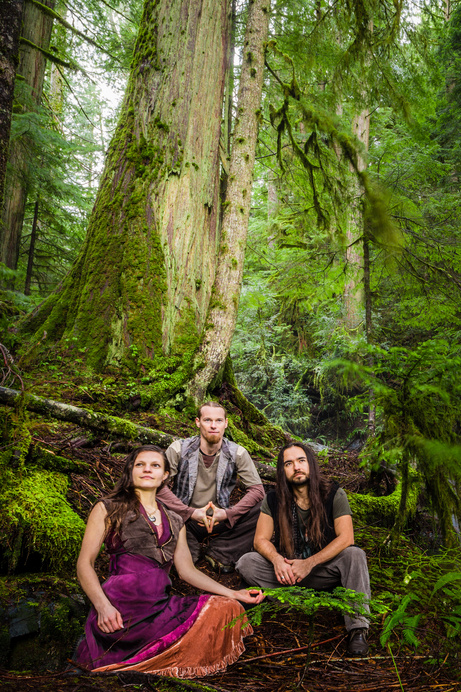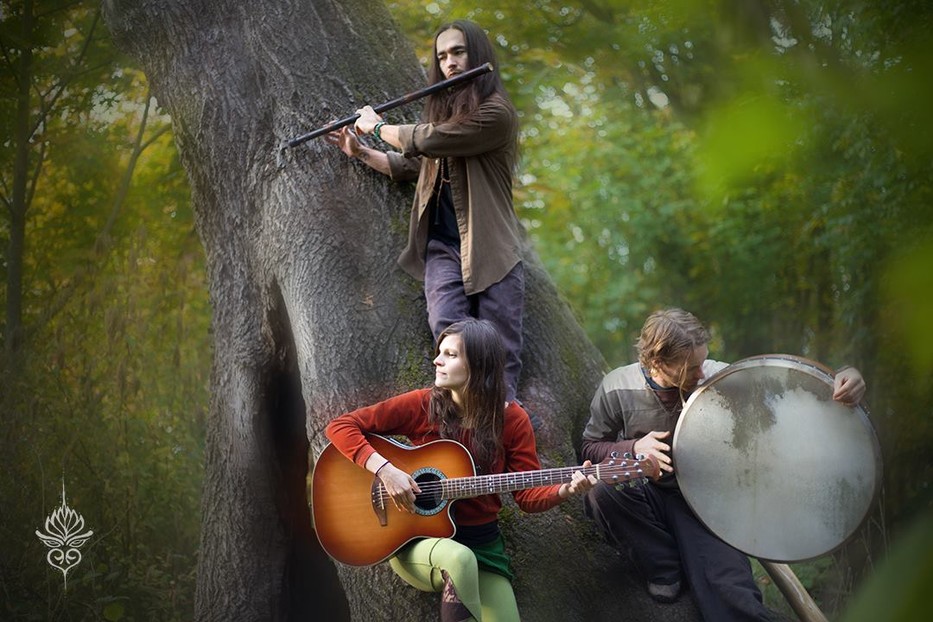Echoes talks to New Age band Yaima about new album, OvO.
Podcast: Play in new window | Download
Subscribe: RSS
New Age music has been surprisingly resistant to contemporary music trends, but a group called Yaima is changing that, mixing new age mysticism and lyrics, with world music touches and electronic dance music grooves. Strip away the new age imagery and you might set them alongside bands like Goldfrapp or Purity Ring. They recently released their second album, OvO.
Pepper Proud, that’s her real name, was born and raised in the Appalachian hills of West Virginia and that’s the music she heard growing up. “Appalachian music is such a part of the culture; you go to a friend’s house, sit on the porch, and play banjo, mandolin, and guitar, and you jam,” Proud remembers. “That was my major influence and all these old Appalachian songs coming through my friends and my teachers there. Yeah, it was a way of life.”
But Pepper Proud isn’t in Appalachia anymore. Physically, she resides in Washington State and spiritually, in a cosmic state. These days you’re more likely to see her at transformational festivals rather than back porch jams. These are New Age style events like Burning Man, Symbiosis Gathering and Boom that fall somewhere between a rave and a yoga retreat.
“Transformation festivals are a gathering for this culture that we’re in. It’s where we all gather and celebrate art, love, life, and what we all create together,” reflects her partner, Masaru Higasa..
What Yaima creates is an enchanting music weaving Masaru’s electronic grooves and ambiences, world music percussion from Jeff Kimes, and Pepper’s mystical lyrics and ethereal voice. Pepper Proud weaves themes of ecology, world peace, and evolution into tales that sound like they were from an ancient time but are totally of the 21st century. Pepper considers herself a storyteller.
“If you think about it in the way of storytelling,” says Proud, “how Appalachian roots is all about passing on tradition and passing on stories, and how we’re in a position now of changing that story and carrying on a new story, and passing these songs on and telling new stories so that people have new things to gravitate towards and to recycle and return into other things,”.
That’s somewhat the theme of the albums title, OvO. “OvO means seed or egg, the beginning of something,” Proud explains. “It means the crucial moment right before the crack of the seed, right before it begins to open.”
Masaru Higasa grew up in Okinawa and came to America when he was 21, about 12 years ago. He was already making electronic music under his own name. “Mainly my music is based off of drone music,” Higasa enthuses. “The whole sound journey evolution is based off of the tamboura instrument or pads, which kind of puts you in that trance, and that’s kind of basically what I work off of.”
He teamed up with Pepper Proud on her second solo album, which marked her transition from Appalachian folky to cosmic diva. Both musicians have worked in different forms of music therapy. Pepper Proud studied it in college and used it to open up people to singing. “I really believe that the human body has this instrument for a purpose and it’s kind of my mission these days to help people rekindle that and find that again,” says Proud. “That’s kind of how I weave music therapy back in: just being with people one on one and helping them discover their instruments.”
Masaru lists “float guide” as one of his jobs. “I used to work at a float center on sensory deprivation tanks,” explains Higasa. “Yeah, I used to guide people on how to release and relax into the float tank experience. I used to actually hold sound journeys while people floated and guide them through their whole float experience.”
It’s a short step from that into heightened states of consciousness. Yaima look like they could be at a Grateful Dead show and their lyrics and songs have a gentle lysergic flow to them. But they’re on the far side of the 60s generational divide. The distance between their experience and the 1960s can be heard when we talk about their song, “Our Game”. I suggest it sounds like a modern version of the Timothy Leary slogan: “Turn on, tune in, and drop out.”
At first, both laugh, “What song is that?” Then, after I prompt them to Leary’s famous phrase, Proud seems to remember and replies, “Oh, yeah. I mean it could be, it could be anything. It doesn’t have to be a psychedelic experience to allow yourself to break through like that, but I do believe that there are medicines available to us and experiences available to us that can help us restructure the patterns that we might get stuck in or feel stuck in.”
“A lot of people do experience our music on psychedelics, for sure,” maintains Higasa.
“Yeah, at the festivals, it’s definitely a common theme,” concurs Proud.
As Pepper Proud and Masaru Higasa might guide you in vocalizing or floating, Yaima consider themselves a soundtrack to a journey through your mind. “What really touches me when I’m on stage playing music and I look out into the crowd, I see people with their eyes closed,” exudes Higasa. “If they have their eyes closed and they’re going within themselves and on their own journey, that’s what makes me most happy because I know they’re really feeling the music. Something’s going on; they’re healing in their own way. And that’s what its all about for me.”
“Yeah, a lot of times we’ll look out into the crowd and people will just have their hands on their heart and we talk about it afterwards like that’s why we do this,” gushes Proud.
Yaima, by the way, is a word from South America.“Yaima was a word that meant “that which water runs through,” Proud defines. “It means you can point to a river and say Yaima. You can point to a lake and say Yaima. You can point to a conduit and say Yaima. You can point to a human and say Yaima.”
Or you could go with the flow and point to OvO, the latest album by Yaima.

Espectacular grupo!!! Me lleva a mis profundidades con su música y la voz de Proud me hace que me exprese y seguirla !!! Los amo ❤️✨✨✨ Gracias por este maravilloso artículo